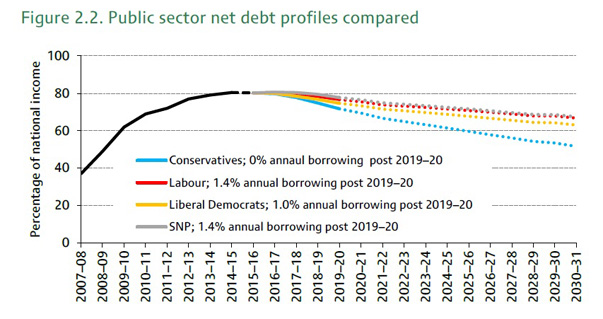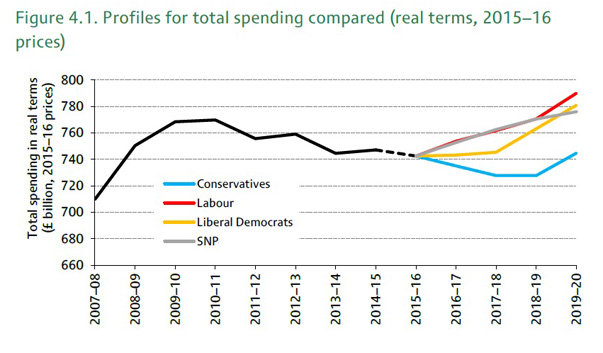Britain’s biggest parties are all failing to tell the electorate the whole truth about their spending plans, according to the Institute of Fiscal Studies (IFS).
The think-tank has just published a major analysis/tongue-lashing of budget plans set out by the Conservatives, Labour, the Lib Dems and the SNP.
Most of the parties are using parts of the paper to attack their rivals – while claiming that the IFS has got it wrong about their own policies.
Let’s look at some of the claims flying around.
 “It is a plan so extreme that IMF figures show Britain would be facing the deepest cuts over the next three years of any advanced country in the world.”
“It is a plan so extreme that IMF figures show Britain would be facing the deepest cuts over the next three years of any advanced country in the world.”
Ed Miliband, 23 April 2015
This claim that the Tories are planning to cut spending more than any other advanced economy is based on figures in table A3 on page 67 of this IMF document.
On this measure of government spending, it’s true that the UK budget deficit is expected to fall from -4 per cent of GDP in 2015 to -0.5 per cent in 2018:
A consolidation of 3.5 per cent of GDP is indeed the biggest any advanced economy is predicted to attempt over the same period.
One obvious comeback would be that the UK still has an unusually large deficit – the third biggest of any of the economies listed here. By comparison, France’s deficit in 2015, according to this measure, is -2.5 per cent and Germany’s is just 0.3 per cent.
So if Britain wants to balance the books it has to make much bigger cuts than most other countries.
Carl Emmerson from the IFS made that point today, saying: “One reason why the Conservative plans involve more austerity than that planned in many other advanced economies is that the UK has a relatively large deficit.”
 “In the 10 similar episodes across OECD countries for which there is available data, public health spending fell by an average of 1 per cent of GDP – equivalent to a real terms cut of £7bn to the NHS.”
“In the 10 similar episodes across OECD countries for which there is available data, public health spending fell by an average of 1 per cent of GDP – equivalent to a real terms cut of £7bn to the NHS.”
Labour press release, 23 April 2015
Labour say they have analysed figures on historical health spending in OECD countries since 1960 and found ten occasions where there were public spending cuts of a similar magnitude to those planned by the Conservatives.
On average, there was apparently an average reduction in health spending as a share of GDP of 1 per cent while the cutting was being done.
We’ve no reason to doubt Labour on this, but it’s only fair to point out that the Conservatives have specifically pledged that they will increase real-terms spending on the NHS over the next parliament – and by considerably more than Labour.
It may or may not happen, but that is the promise, and it is an assumption the IFS used to make its latest calculations on Tory spending plans.
 “The IFS, they have advice and sharp words for all parties, but they nonetheless acknowledge that the Liberal Democrats have been more transparent, more open, more overt with the British people about the choices needed to balance the books and do so fairly.”
“The IFS, they have advice and sharp words for all parties, but they nonetheless acknowledge that the Liberal Democrats have been more transparent, more open, more overt with the British people about the choices needed to balance the books and do so fairly.”
Nick Clegg, 23 April 2015
It’s true that the IFS says the Lib Dems “have provided more detail of their fiscal plans up to 2017–18 than other parties”. The plans suggest that Nick Clegg’s party are essentially aiming at a middle ground. They will cut less than the Tories but borrow less than Labour.
But Mr Clegg didn’t mention one important criticism. Like the Conservatives and Labour (but NOT the SNP), the Lib Dems are suggesting they will be able to raise billions from cracking down on tax avoidance and evasion.
Their target for this big tax claw-back is the most optimistic: £10bn over the whole parliament, compared to £5bn for the Conservatives and £7.5bn for Labour in the same period.
The IFS talked today about the lack of detail on these numbers, but director Paul Johnson put it more bluntly in a recent interview when he said the three parties were simply “making up numbers”.
If that’s true, the Lib Dems have simply made up the biggest one.
 “SNP plans will see real terms increases in government spending, not cuts.”
“SNP plans will see real terms increases in government spending, not cuts.”
SNP Finance Secretary John Swinney, 23 April 2015
The IFS has basically accused the SNP of misleading voters over claims that it offers an alternative to austerity.
IFS numbers suggest the nationalists would actually reduce government borrowing on an almost identical trajectory to Labour (look at the grey and red lines here):
Would that imply “cuts” from the SNP? It depends what you mean. The nationalists would spend more than any other party on social security, but it would still have to cut “unprotected” departmental budgets – and by a bit more than Labour – to help get the deficit down.
Overall, both parties would increase total public spending in real terms, but Labour would spend more than the SNP from 2018/19:
Both Labour and the SNP say the numbers are wrong because the IFS has made unfair assumptions about how much they really plan to borrow.
If both parties are right, it’s possible for the SNP to claim that they are offering less austerity than Labour, but we don’t know what the numbers would look like.
 “Fact that IFS hasn’t felt need to pore over #UKIPManifesto as it has other parties is testament to fact that #UKIP has fully costed policies.”
“Fact that IFS hasn’t felt need to pore over #UKIPManifesto as it has other parties is testament to fact that #UKIP has fully costed policies.”
Ukip tweet, 23 April 2015
No. This makes it sound like the IFS said it didn’t need to analyse Ukip’s manifesto because it was more credible than the other parties.
In fact, the think-tank made it absolutely clear that it only had the time and resources to look at the manifestos of the parties expected to win the most seats in the general election, so it chose the Tories, Labour, the Lib Dems and the SNP and was forced to ignore Ukip and the Greens.
Fact that IFS hasn’t felt need to pore over #UKIPManifesto as it has other parties is testament to fact that #UKIP has fully costed policies
— UKIP (@UKIP) April 23, 2015
We looked at Ukip’s manifesto last week. It’s true that they are the only party to have got a respected think-tank (CEBR) to check some of the spending assumptions in their manifesto.
But the CEBR did not make a judgement on the economic impacts of two of Ukip’s biggest policies – cutting immigration and pulling out of the EU.
The IFS may not have had time to look in detail at the Greens’ plans, but Mr Johnson made this swipe at Natalie Bennett’s party in a Times article yesterday:
“This sense that there is free money out there just waiting to flow into the Treasury’s coffers without anyone noticing reached new levels in the Green party manifesto, which claims to have identified a truly staggering £200 billion worth of tax revenue from tax avoidance, financial transactions, the rich and the wealthy.
“That would be laughable if it weren’t playing into a wider narrative that there is a magic money tree that we can pluck at will. There isn’t.”







